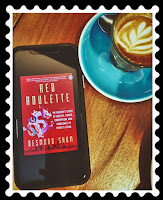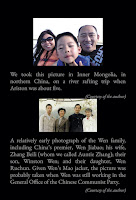I dithered before borrowing an e-book from the National Library. It took two weeks for me to get the book because all NLB's 129 e-copies were out on loan. To me, Chinese businessman Desmond Shum's 'Red Roulette' (2021) is a frightening horror story that is unfortunately not all fiction.
The book is touted as a 'memoir', borne out of the four-year disappearance of the author's ex-wife and business partner, power mover and shaker Whitney Duan (段伟红, Duan Weihong). The publishers sold his book as "An Insider's Story of Wealth, Power, Corruption and Vengeance in Today's China". The Washington Post's review of the book by Eva Dou published on September 10, 2021 said,
Shum paints a vivid portrait of the waning days of China’s era of ebullience. Self-made billionaires, Duan and Shum included, scrabbled to the top, greasing palms along the way. Family members of senior officials sought business deals and enriched themselves.
With the help of political connections, Duan and Shum secured lucrative projects, including one to build an enormous air cargo hub attached to Beijing’s international airport. To help seal these sorts of deals, as Shum wrote in the book, they would drop $1,000 just for a soup made of fish maw, the air bladder of a large fish, and shower their business contacts with luxury watches. “This was pocket change to the people who accepted them,” he wrote. “It wasn’t so much a bribe as a sign of our affection.”
This book was written in English, apparently. The author acknowledged experienced journalist and historian on Chinese history John Pomfret as his "writing partner". It's not something I'm keen to read because it reminds me of a political reality that can happen to this country. Not so much of the wheeling and dealing, because that's always present. It's the persecution and overarching national security laws that scares me. (Reviews here, here, here and here.)
It's no secret that Chinese citizens or China-born citizens in China and now Hong Kong routinely get taken away for questioning by the police. They are detained and 'disappear' for a few months without informing their next of kin of any sort of arrest or legal lawsuits involved. This has only increased since Xi Jinping came into power in 2012 and instituted a sweeping crackdown on corruption, business extravagance and political rivals.
Desmond Shum left the country in time, but his ex-wife Whitney Duan wasn't spared in the sweeping anti-corruption crackdowns. Desmond Shum (沈栋) told the world's media that his ex-wife disappeared in 2017 Beijing, and suddenly resurfaced via phone call. The author doesn't live in China, and at this point, lives in Britain. He wanted to tell the world his family's story, and I'm not sure he really cares about what will happen to his ex-wife who appears not to have been formally charged with any wrongdoing. He claimed that in this phone call after four years, Whitney Duan requested for him to halt the publication of the book.
The book itself is a decent read. The author included a few personal photos as well. It detailed the author's personal life, and his life with Whitney Duan, which felt more like a business relationship than a relationship with genuine affection. It was definitely conducted with a lot of strings attached. He was part of a business group that built Bejing's largest air cargo logistics facility, and the Bulgari Hotel.He also talked a lot about an 'Auntie Zhang', who is known for controlling the diamond trade and regulators in China. Auntie Zhang is also then-Chinese Prime Minister Wen Jiabao's wife, Zhang Beili or more accurately in hanyu pinyin, Peili (张培莉). Auntie Zhang, her son Winston, and her extended family had a close relationship with Whitney Duan. That was how the connections flowed and cast an intricate network of deal-making across China.
Those two ordeals taught me a lot about the vagaries of life, especially in China. I learned that friendships aren't reliable. Nor are marriages. What kind of relationship is left?
Obviously, these issues arise outside China, too. But a few things set these stories apart. One is the hard-hearted, zero-sum, winner-take-all approach pursued by Whitney, Ding Yi, and even Ding Yi's second wife, Yvonne, the former bar girl who, after her husband declared bankruptcy, succeeded him to become the chairwoman of the company listed on the Hong Kong Stock Exchange. Yvonne's bizarre story was yet another example of the type of "great leap forward" not unusual in China of the day.
That give-no-quarter feature is a function of the Communist system. From an early age, we Chinese are pitted against one another in a rat race and told that only the strong survive. We're not taught to cooperate, or to be team players. Rather, we learn how to divide the world into enemies and allies — and that alliances are temporary and allies expendable. We're prepared to inform on our parents, teachers, and friends if the Party tells us to. And we're instructed that the only thing that matters is winning, and that only suckers suffer moral qualms. This is the guiding philosophy that has kept the Party in power since 1949.
Desmond Shum's stories remain as stories, unless you have friends or loved ones who face a travel ban, and then disappeared in China too. Then you'd have stories to match or rival his. At this point, I'll take it as anecdotal, with a few facts verified. I don't have any business interests in China. Neither does the man or the family nor the faeriefolk. I have few anecdotes of China to share. It's a world I'm unfamiliar with, and I don't care to be involved in. Look at what Hong Kong society has become in a mere two years. Oh, where is Jack Ma?
The wonderful thing about e-books — the search function. For fun, I typed in 'Singapore' just to see what paragraphs and context the country was mentioned. I grimaced. Ouch. This does nothing for our country's image, whom the government tries super hard to play neutral and appear so, but we all know it grants a lot of leeway to China, and with its public-private partnership in Chinese projects, some of which have spectacularly failed. *cough Singapore-China *ahem Industrial Parks *cough
Singapore's state-owned investment funds were masters at cozying up to a group known as "the princelings," the sons (and daughters) of Community Party bigwigs. Various firms associated with the Singaporean government invested money into Winston's firm as well as funds associated with the grandson of Party General Secretary Jiang Zemin, and others. Of all the peoples in the world, the Singaporeans knew how the game was played in China and profited considerably from that knowledge. Eventually, many other sons and daughters of Chinese leaders would follow Winston into private equity and obtain capital from Singapore. Winston was an early adopter.


No comments:
Post a Comment